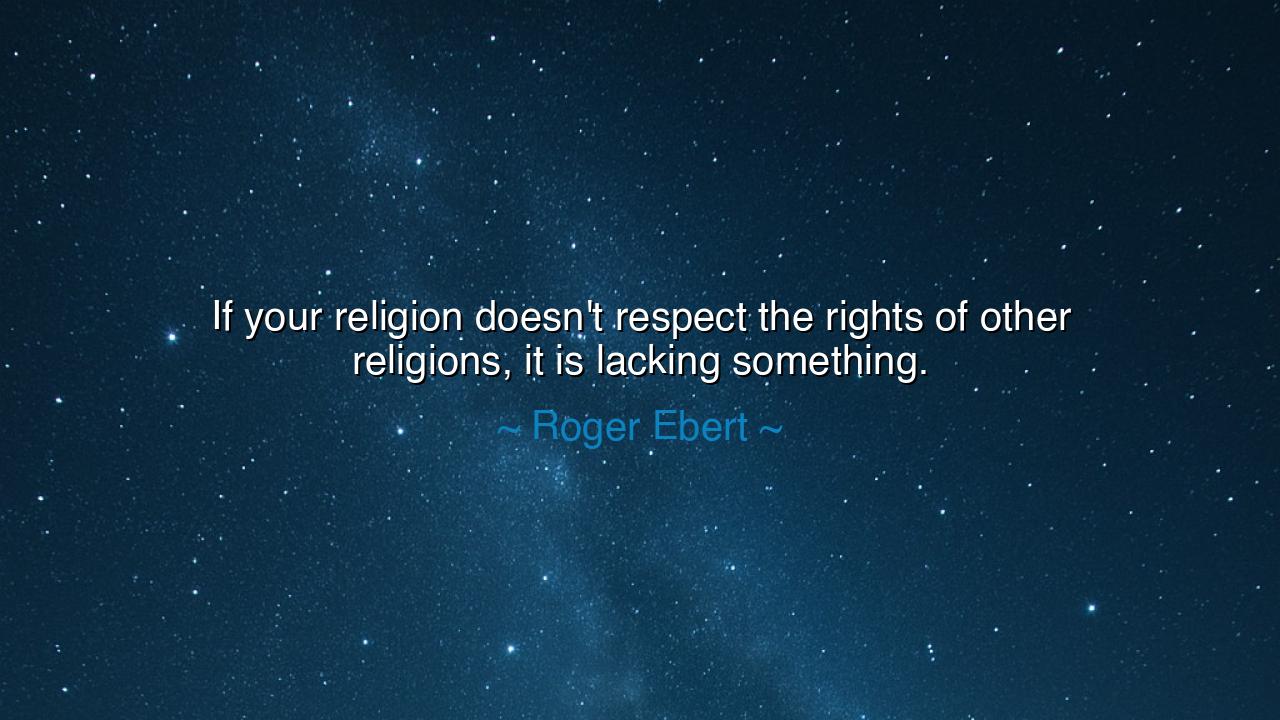
If your religion doesn't respect the rights of other religions
If your religion doesn't respect the rights of other religions, it is lacking something.






The words of Roger Ebert—“If your religion doesn't respect the rights of other religions, it is lacking something”—are not merely a call for tolerance; they are a test of spiritual maturity, a mirror held up to the soul of faith itself. In these few words, Ebert reminds us that the purpose of religion is not domination, but illumination—not to exalt one group above another, but to awaken within all people the shared dignity that flows from the same divine source. His insight shines with the wisdom of the ancients: that no creed is complete if it cannot recognize the sacred in another’s path. A faith that breeds contempt has turned from heaven to pride, and in doing so, has lost the light that gave it birth.
To understand the depth of this quote, we must see beyond the name of the speaker. Roger Ebert, known to many as a film critic, was also a philosopher of life—a man who had gazed deeply into human nature through the stories told on screen. In his later years, after illness had silenced his voice, his writings became more reflective, more spiritual. He came to see that the great conflicts of humanity were not born from belief itself, but from the refusal to honor difference. His words emerge from this awareness: that religion, in its truest form, should lift humanity upward, not divide it into tribes of the self-righteous. A faith that cannot coexist with others is like a tree that refuses to share sunlight—it grows twisted and barren, its roots strangled by its own narrowness.
The ancients, too, wrestled with this truth. The philosopher Ashoka the Great, emperor of India in the 3rd century BCE, offers a shining example. After witnessing the horrors of war, Ashoka turned from conquest to compassion and embraced Buddhism. Yet, rather than imposing his new belief, he issued his Edicts of Tolerance, carved into stone across his empire. In them, he commanded that all faiths be honored, for, as he wrote, “He who praises his own religion, disparaging another, only harms his own faith.” Thus, more than two millennia ago, a ruler understood what Ebert would echo in modern words: that respect for others’ faith is the truest measure of one’s own.
History, alas, is heavy with the cost of forgetting this truth. The Crusades, the Inquisition, the burning of heretics, and the persecution of those deemed impure—these were not acts of faith, but of fear disguised as devotion. Every age has seen those who, convinced of divine favor, have sought to silence the voices of others. Yet the lesson of time is unyielding: the sword may cut down the believer, but it cannot destroy belief. Where intolerance reigns, peace withers. Where respect blossoms, humanity thrives. Ebert’s warning is thus both timeless and urgent—when a faith loses its compassion, it ceases to serve God and begins to serve the ego.
In truth, all religions are rivers flowing toward the same sea. Their languages differ, their rituals vary, yet their essence—love, mercy, humility, and justice—is one. The wise see this unity and rejoice in its diversity. As the poet Rumi once wrote, “The lamps are different, but the Light is the same.” When Ebert says a religion that disrespects others is lacking something, he points to this missing element—the recognition of shared humanity, the awareness that no one path can claim the whole of truth. A complete faith does not fear others’ beliefs; it seeks to understand them, knowing that truth, like light, grows brighter when reflected from many faces.
There is a quiet heroism in practicing this respect. To listen to the prayer of another without judgment, to see the divine in a stranger’s ritual—this is an act of courage. It is easy to love one’s own creed, but it is the mark of a spiritual giant to love the faith of another without feeling diminished. The world does not need more temples or churches; it needs hearts spacious enough to hold the sacredness of all. As the old saying goes, “Where love is, God dwells.” A religion that teaches otherwise may have laws, power, and followers—but it lacks the one thing that gives it life: the presence of grace.
The lesson of Ebert’s words, then, is both simple and profound: measure your faith not by how devoutly you worship, but by how deeply you respect. To honor others’ beliefs is not weakness—it is wisdom. To defend another’s right to worship differently is to defend the very spirit of your own freedom. If your religion teaches you to fear or despise, it is not your god who demands it, but your pride. Seek instead the path that widens the heart, that honors the divine wherever it appears, for the divine is not bound by names or nations—it dwells wherever compassion is found.
So, my child, when you encounter another who prays differently, do not see a rival—see a fellow traveler on the road to truth. Listen, learn, and love. For when you respect another’s faith, you strengthen your own; and when you honor the divine in others, you bring the divine closer to yourself. This is the wisdom Roger Ebert leaves behind: that religion without respect is hollow, but faith that embraces difference becomes eternal—a light that no darkness can extinguish, a song that all souls may one day sing together in harmony.






AAdministratorAdministrator
Welcome, honored guests. Please leave a comment, we will respond soon